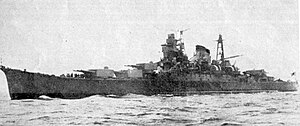Japanese cruiser Kumano

Kumano in October 1938
|
|
| History | |
|---|---|
|
|
|
| Name: | Kumano |
| Namesake: | Kumano River in Wakayama Prefecture |
| Builder: | Kawasaki Shipyards, Kobe, Japan |
| Laid down: | 4 April 1934 |
| Launched: | 15 October 1936 |
| Completed: | 31 October 1937 |
| Fate: | Sunk, 25 November 1944 |
| General characteristics | |
| Class and type: | Mogami-class cruiser |
| Displacement: | 13,440 long tons (13,660 t) (full load) |
| Length: | 201.6 m (661 ft 5 in) |
| Beam: | 22 m (72 ft 2 in) |
| Draft: | 5.5 m (18 ft 1 in) |
| Installed power: | 152,000 shp (113,000 kW) |
| Propulsion: |
|
| Speed: | 35 kn (40 mph; 65 km/h) |
| Complement: | 850 |
| Armament: |
|
| Armor: | |
| Aircraft carried: | 3 × Aichi E13A (Type 1) reconnaissance floatplanes |
| Aviation facilities: | 2 × catapults |
Kumano (熊野?) was one of four Mogami class of heavy cruisers in the Imperial Japanese Navy, serving in World War II. She was named after the Kumano River Kii Peninsula on the island of Honshu in central Japan. The Mogami-class ships were constructed as "light cruisers" (per the Washington Naval Treaty) with five triple 6.1-inch dual purpose guns. They were exceptionally large for light cruisers, and the barbettes for the main battery were designed for quick refitting with twin 8-inch guns. In 1937 all four ships were "converted" to heavy cruisers in this fashion.Kumano served in numerous combat engagements in the Pacific War, until she was eventually sunk by carrier aircraft from Task Force 38 while she was undergoing repairs at Santa Cruz, Philippines in November, 1944.
Built under the Maru-1 Naval Armaments Supplement Programme, the Mogami-class cruisers were designed to the maximum limits allowed by the Washington Naval Treaty, using the latest technology. This resulted in the choice of the dual purpose (DP) 15.5 cm/60 3rd Year Type naval guns as the main battery in five triple turrets capable of 55° elevation. These were the first Japanese cruisers with triple turrets. Secondary armament included eight 12.7 cm/40 Type 89 naval guns in four twin turrets, and 24 Type 93 Long Lance torpedoes in four rotating quadruple mounts.
...
Wikipedia
